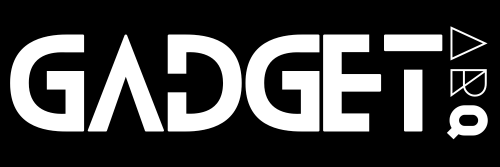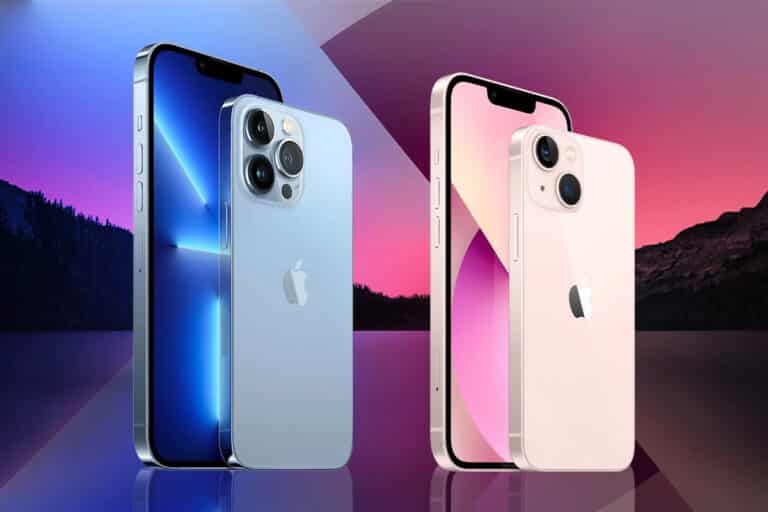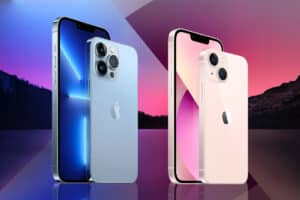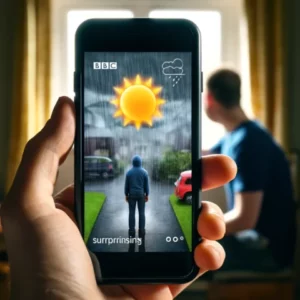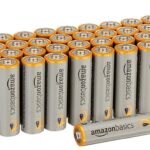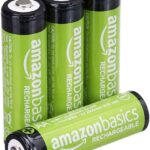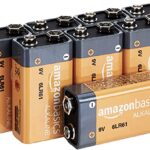As in iPhone 13 vs. iPhone 13 Pro battle, who came out on top? That’s simple. That is until you consider the financial implications of buying the best. But bear with us.
This iPhone 13 is ideal for the average smartphone user, providing exceptional performance, high-quality images, and video, and long battery life. An iPhone 13 Pro improves on this by including a larger display and a second camera on the rear for even more creative photography. You must, however, pay an additional $200 again for the privilege.
Still undecided about whether or not to go pro? The comparison of the iPhone 13 and iPhone 13 Pro should help you decide which one is best for you.
What you will see here?
At a glance:
| iPhone 13 | iPhone 13 Pro | |
|---|---|---|
| Costs | $799 | $999 |
| Storage | 128, 256, 512 GB | 128, 256, 512, 1TB |
| Screen size | 6.1 inches | 6.1 inches |
| Resolution/ppi | 2532 x 1170/460 | 2532 x 1170/460 |
| Adaptive refresh rate | No | Up to 120Hz |
| Chip | A15 Bionic | A15 Bionic |
| Rear cameras | Dual 12MP (Wide, ultrawide) | Pro 12MP (Telephoto, Wide, Ultra Wide) |
| Zoom | None / 5x digital | 3x optical / 15x digital |
| Front camera | 12MP TrueDepth | 12MP TrueDepth |
| Colors | Red, Starlight, Midnight, Blue, Pink | Graphite, Gold, Silver, Sierra Blue |
| Size | 5.8 x 2.8 x 0.3 inches | 5.8 x 2.8 x 0.3 inches |
| Weight | 6.14 ounces | 7.2 ounces |
| Water resistance | IP68 | IP68 |
| Battery life | 10:33 | 11:42 |
Availability and Price
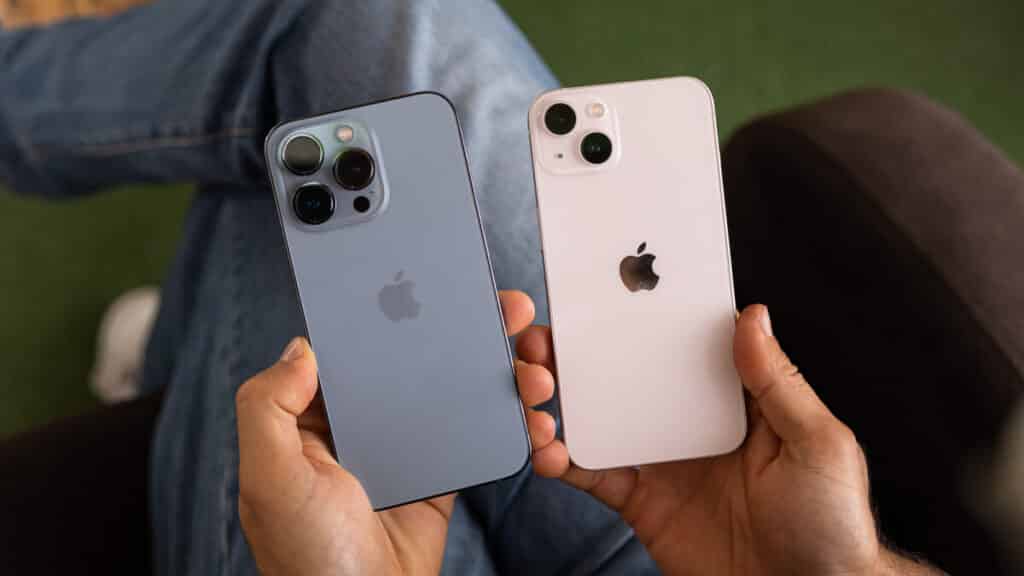
The iPhone 13 and iPhone 13 Pro have been available in stores from September 24, 2021.
For iPhone 13 begins at $799 / £799 / AU$1,349 for 128GB model, rising to $899 / £879 / AU$1,519 for the 256GB model and $1099 / £1079 / AU$1,869 for the 512GB model.
The 128GB variant of the iPhone 13 Pro costs $999 / £949 / AU$1,699, while the 256GB model costs $1,099 / £1,049 / AU$1,869, as well as the 512GB model costs $1,299 / £1,249 / AU$2,219. On the other hand, there are also plenty of iPhone 13 bargains available on both models.
As a result, the iPhone 13 Pro is by far the more expensive of the two phones. However, it gains an edge of its own with the introduction of a new 1TB version for $1,499 / £1,449 / AU$2,569.
iPhone 13:
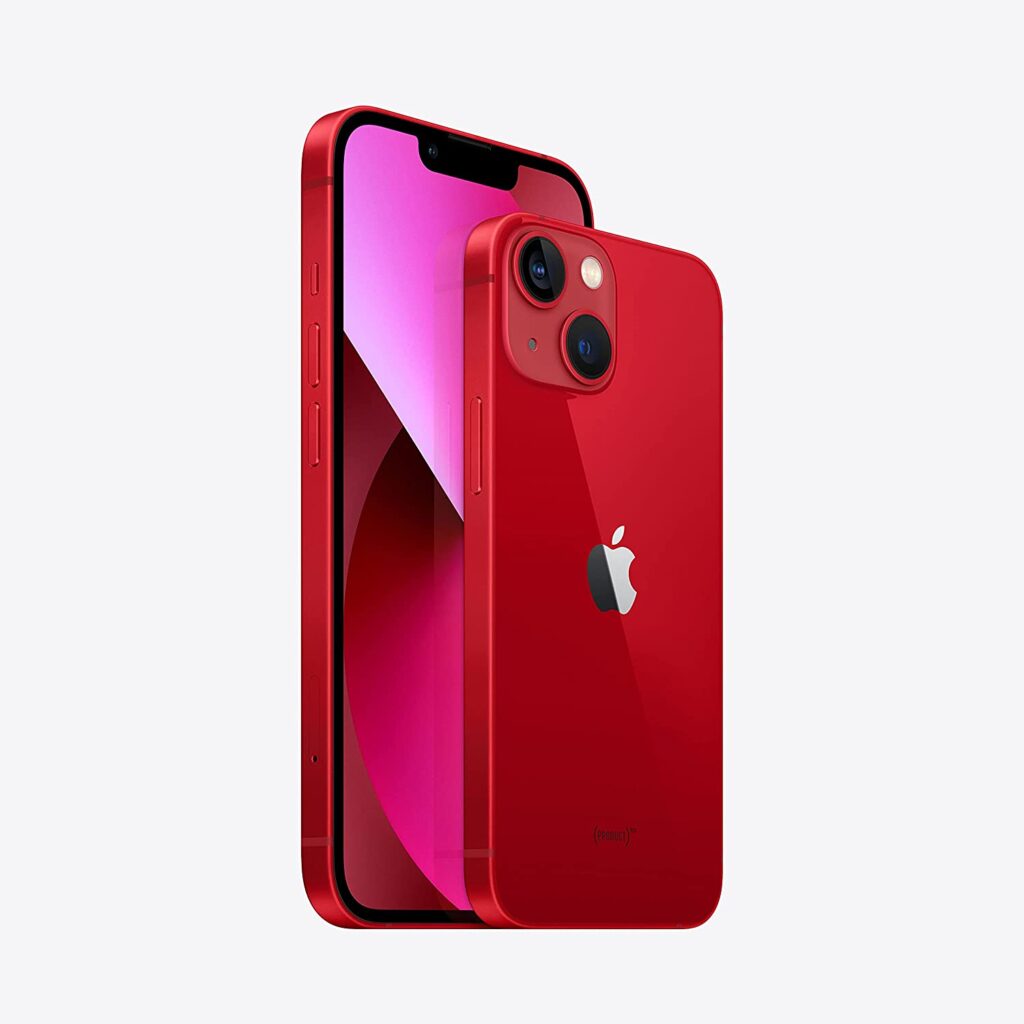
iPhone 13 Pro:
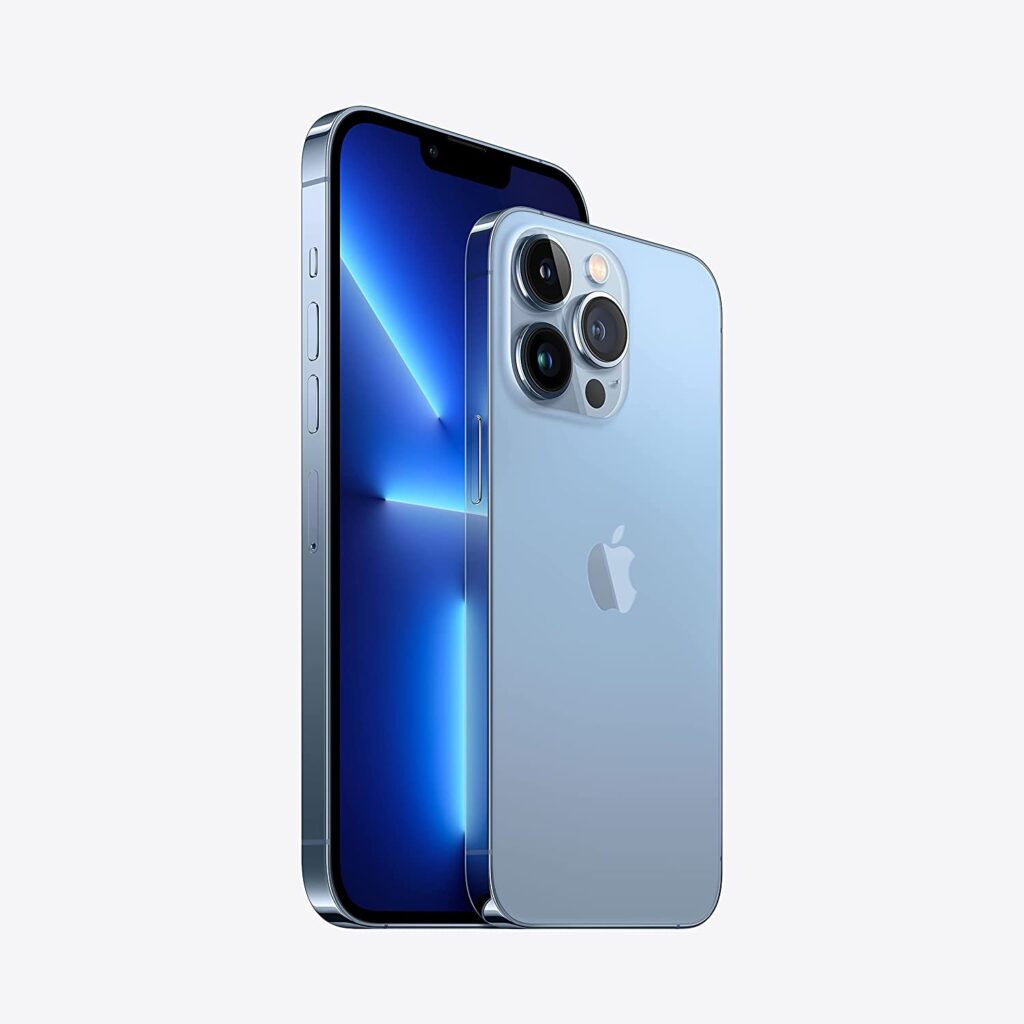
Design and colors
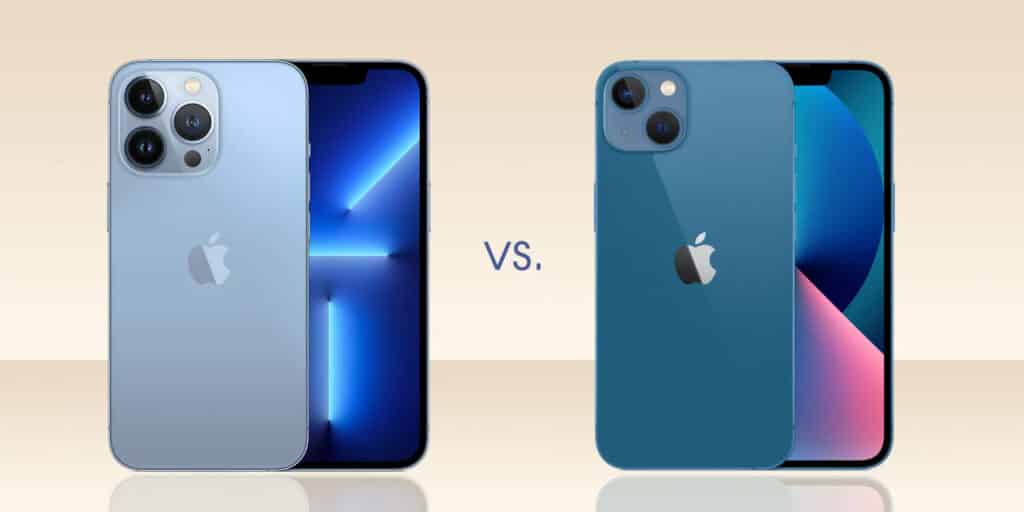
The good news is that the notches on all 4 new iPhone 13 variants are smaller. They’ve been slashed by 20%, giving you a little more screen real estate on whichever device you’re using.
Aside from that, the iPhone 13 models aren’t all that different from the iPhone 12 models in terms of design. They’re all nearly identical in size to last year’s models, except being somewhat thicker (0.30 inches rather than 0.29).
This means the iPhone mini 13 has dimensions of 2.53 x 5.18 x 0.3 inches. While iPhone 13 has dimensions of 2.82 x 5.78 x 0.3 inches. As well as the iPhone 13 Pro has dimensions identical to the iPhone 13. On the other hand, the iPhone 13 Max is 3.07 x 6.33 x 0.3 inches.
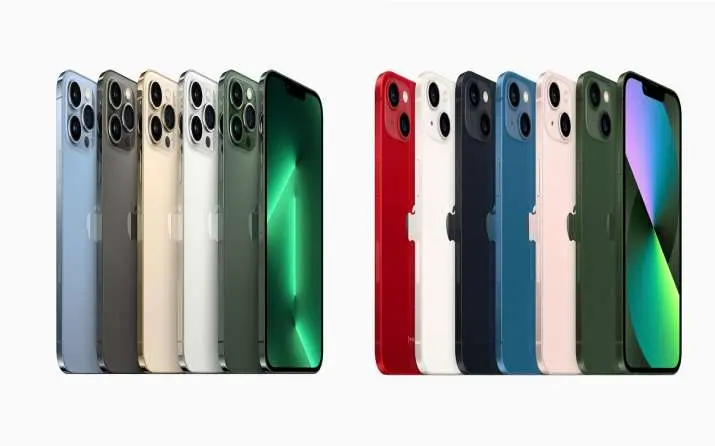
Do have a new camera array here on the back — more on that later — and it’s here where the design variations are most noticeable. Two main lenses are positioned diagonally on the iPhone 13 small and iPhone 13. While three lenses are arranged over a bigger camera module on the iPhone 13 Pro & Pro Max.
The two phones’ color options are also vastly different. Starlight, Midnight, Blue, Pink, and (PRODUCT)RED are the five colors available for the iPhone 13 mini & iPhone 13. Meanwhile, the iPhone 13 Pro & Pro Max only have four color options, but they’re more subtle & appealing to our eyes. Gold, Graphite, Silver, & Sierra Blue are the available colors.
Finally, the iPhone 13 Pro & iPhone 13 Pro Max have textured matte glass on the back. Whilst the iPhone 13 and 13 small have normal glass.
In the end, there’s not much to it in terms of design, and it’s unlikely to influence your decision on which model to purchase.
iPhone 13 vs. iPhone 13 Pro: Displays
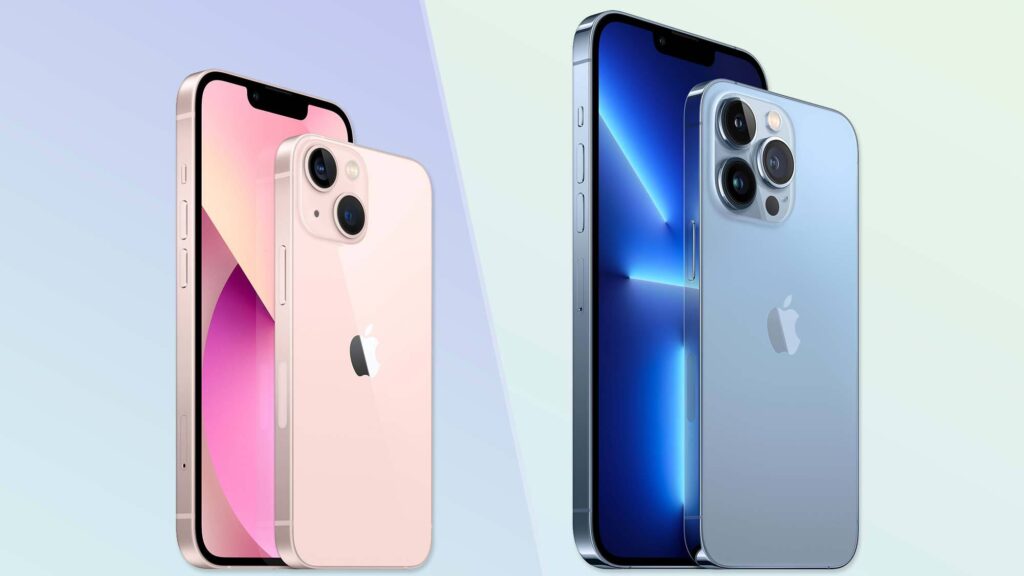
All four iPhone 13 models retain their former screen sizes, with the iPhone 13 small having a 5.4-inch display as well as the standard iPhone 13 & iPhone 13 Pro both having a 6.1-inch display. Of course, the iPhone 13 Pro Max seems to be the largest, with a 6.7-inch display.
Apple’s latest Super Retina XDR OLED panels are used in all four versions. The display on the iPhone 13 has a usual outdoor brightness of 800 nits as well as a peak level of 1200 in HDR mode, resulting in a brightness increase of 28%. In comparison, the iPhone 13 Pro Max models’ displays are 1000 nits in normal outdoor use and may reach 1200 nits.
The greatest difference between iPhone 13 & iPhone 13 Pro devices is the latter’s ProMotion display, which has an adjustable refresh rate that allows it to shift from a fast to save battery life and reduces the frequency from 120Hz to 10Hz.
Surprisingly, Apple didn’t include a 120Hz display in all four iPhone 13 models, considering we see such high refresh rates in a lot of low-cost Android phones. However, it is undoubtedly a feature that distinguishes the Pro models from the basic iPhone 13.
Cameras
Each of these phones offers considerable improvements in camera quality. For its twin 12MP system, the iPhone 13 borrows several critical components from last year’s iPhone 12 Pro Max, while the iPhone 13 Pro’s triple 12MP system advances further.
The iPhone 13’s primary sensor can catch 47 % more light than that of the iPhone 12’s and generates 1.7 million pixels rather than the iPhone 12’s 1.4 million. The wide sensor on the iPhone 13 Pro, on the other hand, is much larger, with 1.9 million pixels compared to 1.4 million on the iPhone 12 Pro.
Both cameras have the sensor-shift stabilization technique that made the iPhone 12 Pro Max so impressive in low-light situations last year. Even though both phones’ night modes are amazing, the iPhone 13 Pro takes the cake.
Although both ultra-wide sensors have been enhanced, the iPhone 13 Pro also boasts a 12MP 3X telescopic lens for zoomed-in images. The iPhone 13 needs to crop in on the primary sensor for such close-ups, which is a considerable disadvantage.
Apple Advancements benefit
Apple’s software innovations, of course, help each latest iPhone camera as much as any other hardware improvements. As a result, both phones now include the unique Photographic Styles feature, which allows you to drastically adjust the tone of your images if you want them to be warmer, colder, more colorful, or more contrasty.
Both phones also have a new rack focusing feature called ‘Cinematic mode,’ which essentially gives your films the same appearance that Portrait mode gives stills. It can forecast when a subject will join the frame or even track a subject’s gaze, allowing you to change the emphasis on a scene even after it’s been finished.
The functionality worked well, and it will most likely benefit budding vloggers and filmmakers. Even if it isn’t quite the professional tool Apple claims it to be.
While we’re on the subject of the video, ProRes is a capability that’s exclusive to the iPhone 13 Pro – or will when it’s released. This is a high-quality video codec that contains extra information for better editing. We’ll have to update this once you had an opportunity. However, keep in mind that the 128GB iPhone 13 Pro’s resolution would be limited to 1080p.
: Performance and Specs
In the past, Apple hasn’t differentiated much more in terms of performance, with pro versions using the same A-series CPU as non-Pro devices. With one significant exception, this is basically true again this year.
Apple 5nm A15 Bionic chipset powers both phones. This has a six-core CPU that’s 50% faster than the competition. The iPhone 13 Pro, on the other hand, has an additional GPU core (5 vs. 4), making it a speedier overall performance.
They dare you to discern the difference in practice. Making comparisons between the two phones is futile. On the App Store, there are no apps that come close to reaching their performance restrictions.
The iPhone 13 Pro, on the other hand, has certainly more headroom this year than previous versions. It’ll probably feel quick with a little longer, particularly if you’re doing more intensive work.
But the main lesson is that in terms of sheer performance, neither phone comes even close to either.
Both phones support additional 5G bands than before, allowing them to connect to 5G networks in more countries. Only the US versions get mmWave capabilities, and only a small percentage of Americans would be able to use such speeds anyway.
As previously noted, both phones have 128GB, 256GB, and 512GB of storage. It’s iPhone 13 Pro, on either hand, goes a step further by providing 1TB of storage.
Battery
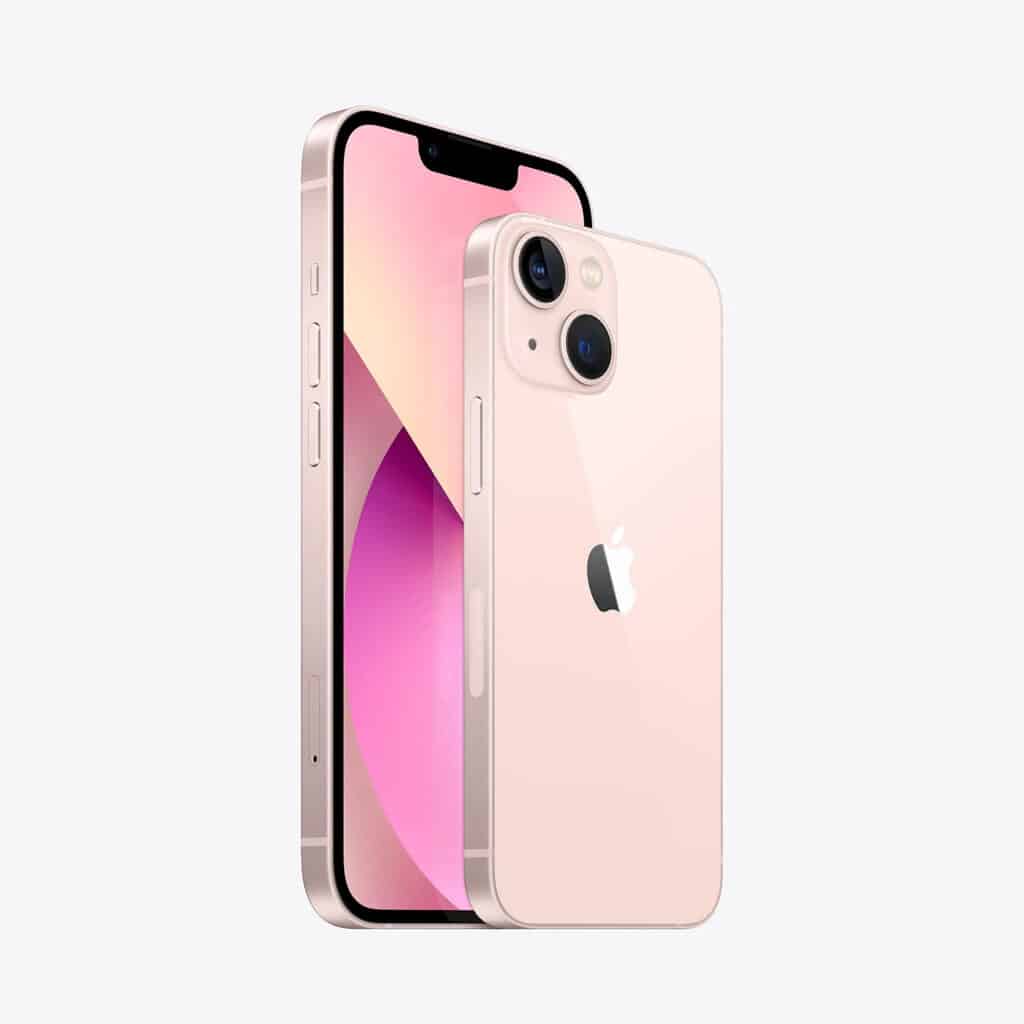
The battery life is the one significant improvement that both these phones have. Both cells are significantly larger than their forerunners. This, combined with the A15 Bionic’s increased efficiency, means both batteries will last significantly longer than before.
The iPhone 13 has a 3240mAh battery, whilst the iPhone 13 Pro has a 3095mAh cell. Giving the Pro smartphone a smaller battery may seem counter-intuitive. However, while the 120Hz display on the Pro appears to become a more power-hungry component, this isn’t the case.
Apple’s smart higher refresh rate technology enables the iPhone 13 Pro’s display to drop below 10Hz when the use case requires it. Only in certain situations, such as scrolling across home screens, menus, and web pages, does it run at full 120Hz.
As a result, the battery life on both phones is amazing. Apple promises that the iPhone 13 will last 2.5 hours longer on a single charge than the iPhone 12, and the iPhone 13 Pro will last 1.5 hours longer than the iPhone 12 Pro.
After one full day of usage, both phones seemed to have about 20% battery life left. Its iPhone 13 will last a little longer, though, because we were able to stretch the screen-on time a little further.
MagSafe is back for another year, this time with 15W magnetized wireless charging. However, like with the ordinary 20W wired charger which both phones support, you’ll have to purchase this separately.
After thirty min on one of these chargers, both phones would be slightly over half-filled. Not spectacular, but not horrible either.
Wait for iPhone 14 or not?
Because the iPhone 13 & iPhone 13 Pro has been available for more than six months, you may be considering waiting for iPhone 14 or iPhone 14 Pro.
If you need a new iPhone right now, say because yours is broken. Both the iPhone 13 & iPhone 13 Pro are excellent choices; in fact, Roland Moore-Colyer switched from Android to iOS because of the iPhone 13 Pro. And, if you acquire either iPhone 13 model. You may now benefit from Apple’s new iPhone Self Service Repair kits, which give you the ability to perform your repairs.
If customers decide to wait, the iPhone 14 Pro is likely to be the phone to acquire. As it is expected to receive more significant updates than the normal next-generation iPhone. According to current reports, the iPhone 14 will be a small upgrade over the iPhone 13. But the iPhone 14 Pro will redesign.
Conclusion
In general, all four iPhone 13 models are incremental improvements over their predecessors. They are, nonetheless, the greatest iPhones available today.
The iPhone 13 is the finest iPhone for most people. According to the iPhone 13, the iPhone 13 mini is a decent choice only for those who want a smaller phone. The iPhone 13 Pro Max is the greatest phone period if you are prepared to invest. That could make this decision difficult.
You’ll like the iPhone 13 Pro or 13 Pro Max. If you want the finest in phone photography, performance, and display from Apple; just make to spend a premium for the latter. The ordinary iPhone 13 might suffice if you don’t mind not having a 120Hz display or telephoto zoom.
Read more:
- Roku Remote Light Blinking: Few Methods to Fix It Instantly!
- Troubleshoot ITV Hub not working issue- Quick fix for the issue!
- iPhone 11 Pro Max Battery Case-Prolonged Battery 🔋🔋🔋Life+Paramount Protection!
- Best selling 360 cases for iPhone 11 Pro Max
- Screen Protector to protect your modish iPhone 13!

